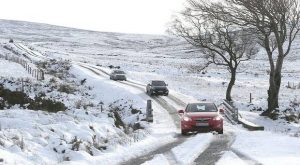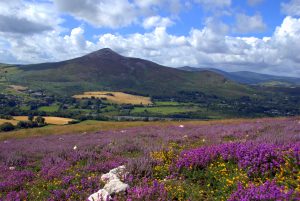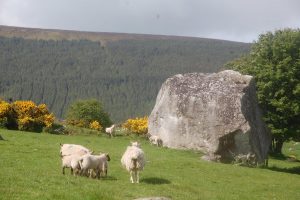Developments on The Heritage Bill
Developments on The Heritage Bill
The passing of the Heritage Bill through both houses of the Oireachtas was completed last week with Seanad Éireann voting to pass the bill without amendment. This news is warmly welcomed by Wicklow Uplands Council who has lobbied successive Governments for the extension of the current permissive burning season since it was shortened by 6 weeks in 2000 without prior consultation.
The provisions found in the Heritage Bill will allow for the controlled burning of upland vegetation in the month of March on a two year pilot basis should circumstances such as severe weather events require an extension to the current permissive dates.
The excessive levels of snow and adverse weather conditions experienced earlier this year, which lasted for many weeks in the uplands region, offers a prime example of why the current season is unworkable and why upland farming communities are delighted with the passing of the Heritage Bill.

Controlled Burning:
Controlled burning when carried out correctly, is widely considered to be a very effective land management technique and to the benefit to both farmers and upland biodiversity. The practice is used to remove areas of older and taller vegetation and allow for the regeneration of young heather for grazing livestock.
By removing some areas of older vegetation and leaving others, a mosaic of habitat type and structure is produced which also provides optimal conditions for upland biodiversity. These areas also act as a fire break which help to prevent or slow the spread of wildfires.
The Uplands Council has often warned of the dangers of unmanaged and excessive vegetation in the uplands should a fire take hold. Unfortunately the recent prolonged dry weather conditions have seen wildfires spreading with devastating affect, which highlights the importance and need for better management practices of upland habitats.
Traditionally, controlled burning was always carried out in the early spring when the previous year’s growth is dry and there is still some moisture in the ground, this helps prevent spread and regrowth is relatively quick.
According to Ciaran Nugent, Forestry Inspector with the Forest Service, Department of Agriculture, Food and the Marine and author of the white paper report ‘Why We Need Prescribed Fire in Ireland’:
“Almost 40 years of fire weather data collected and modelled by Met Eireann and the Department of Agriculture, Food and the Marine clearly supports the position that March is the best and safest time of the year to conduct prescribed burning under Irish conditions.”
The current permissive season from September to the end of February is regarded as unworkable by many of the upland landowners. This has resulted in a decline in the quality and condition of important upland habitats due to decreased farming activities, increased land abandonment and the extent and frequency of unregulated burning.
It is worth noting that at present, the burning season in the Republic of Ireland is out of line with the UK and Northern Ireland dates who allow for controlled burning till April 15th.
Positive Development for the SUAS Project:
News of the bill’s passing is also critical in light of the Upland Council’s new European funded ‘Sustainable Uplands Agri-environment Scheme’ (SUAS) pilot project. SUAS aims to support upland farmers in the best management of their upland habitats and the use of controlled rotational burning will be an important feature of the project.
Training and equipment will be provided to participants and all burning activities will be carried out with the use of integrated management plans and best practice. This includes adhering fully to any legislative notification and reporting requirements.
The SUAS project will also measure the impacts of this controlled burning on the ecology and hydrology of the project’s selected sites and will offer important insights to the value it has as a vegetation management tool.
Wicklow Uplands Council supports the prompt introduction of the Heritage Act as it presents an opportunity for controlled burning to be now conducted within a realistic time period and return our uplands to a more managed condition.



